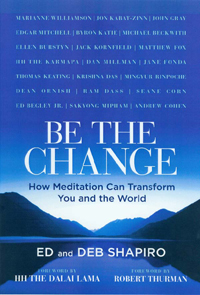
There are some who believe that the world is exactly as it is meant to be and that we are learning important lessons by having challenging difficulties to contend with, or that there is a preordained plan bigger than anything any one of us could know. Perhaps all of the above is true, perhaps not.
Whatever the situation, life on our planet does not always seem so divinely planned. Obviously, we experience times of great joy, wonder, laughter and beauty. We are social creatures and many, if not all, of these good times are due to our relationships and especially to shared love.
But there are also many times when we are not so nice, when we treat each other in ways that belie our sociability. We are attacked for being of a different race or color, women and children are raped and abused, we turn away from helping a stranger for fear of those around us, and huge numbers are starving and homeless.
"I am a Jew and you are not, meaning that as children, we were only allowed to relate to people who were like us," recalls Ed. "I wasn't allowed to bring a friend home or to eat in his home if he was not Jewish. I was taught to fear anyone who was different."
Despite such disregard for each other and ingrained prejudice, and even with the injurious capacity of modern warfare methods, if we look back in time we may be surprised to find that we are actually better behaved and nicer to each other now than we ever were in the past, when we were far more barbaric and disrespectful.
"Throughout history, the human experience has been extremely brutal," says Andrew Cohen in our book, "Be The Change." "For instance, if we were living at the beginning of the Renaissance in Europe and someone broke the law, then their genitals may be cut off or they would be disemboweled. At the time Shakespeare was writing his plays, people's heads were being stuffed on pikes in order to keep the populace in line. In Roman times, a common entertainment was to watch people be eaten alive by lions. So, despite unspeakable and horrible atrocities in our current era, we are actually becoming more civilized."
However, as reassuring as it may be that we are kinder to each other now than we used to be, it would seem that some further evolution is needed in order for us to overcome our aversion so we can appreciate and care for each other on a regular basis.
So what is the continuing cause of our disrespect for each other? What is it that creates so much isolation, loneliness and separation, where we see others who are different from us as the enemy? Why do we treat each other with such disregard and dislike? Is it because we project our hidden fears onto others, making them the problem that needs to be annihilated rather than seeing that the phobia and intolerance actually lie within ourselves?
Mindfulness meditation teacher Jon Kabat-Zinn believes, "We have to learn how to put out the welcome mat for our own shadow side, because when we suppress it, we project it onto others and we get the us-and-them syndrome: We are right and they are not, so let's kill them before they kill us."
This is important, for as much as we have fought the "other" in order to eliminate the enemy or to ensure our own survival, we are now moving into a time where such fighting is actually becoming detrimental to the continued existence of our entire species and is adding to our demise. For us to successfully overcome many of the issues we are facing, whether social, environmental or global, we urgently need to resolve our own prejudices and work together, rather than against each other.
"It seems to me that we are on the brink of an evolutionary leap and that what we are calling the human condition is something that has become outmoded," writes spiritual teacher Gangaji in "Be the Change." "It seemed quite useful at an earlier time, when we really did have to struggle with each other for a piece of food or territory or some shelter. Maybe it is just wired in us, this me-first attitude, or my tribe first, or my nation first, and the idea of attacking others out of fear that something will be taken from us. But we can actually have a cooperative world where we look to each other, because we all need each other for our survival. Before, we needed to overcome each other in order to guarantee our survival; now we need to discover an entirely new way of relating, and we actually need each other to do this."
What do you think? Do comment below.
***
You can receive notice of our blogs every Tuesday by checking "Become a Fan" at the top of this page.
See our award-winning book, "Be the Change: How Meditation Can Transform You and the World," with forewords by the Dalai Lama and Robert Thurman and contributions from Jack Kornfield, Gangaji, Jane Fonda, Ram Dass, Byron Katie and others.
Our three meditation CDs -- "Metta: Loving-Kindness and Forgiveness," "Samadhi: Breath Awareness and Insight" and "Yoga Nidra: Inner Conscious Relaxation" -- are available at www.EdandDebShapiro.com.
